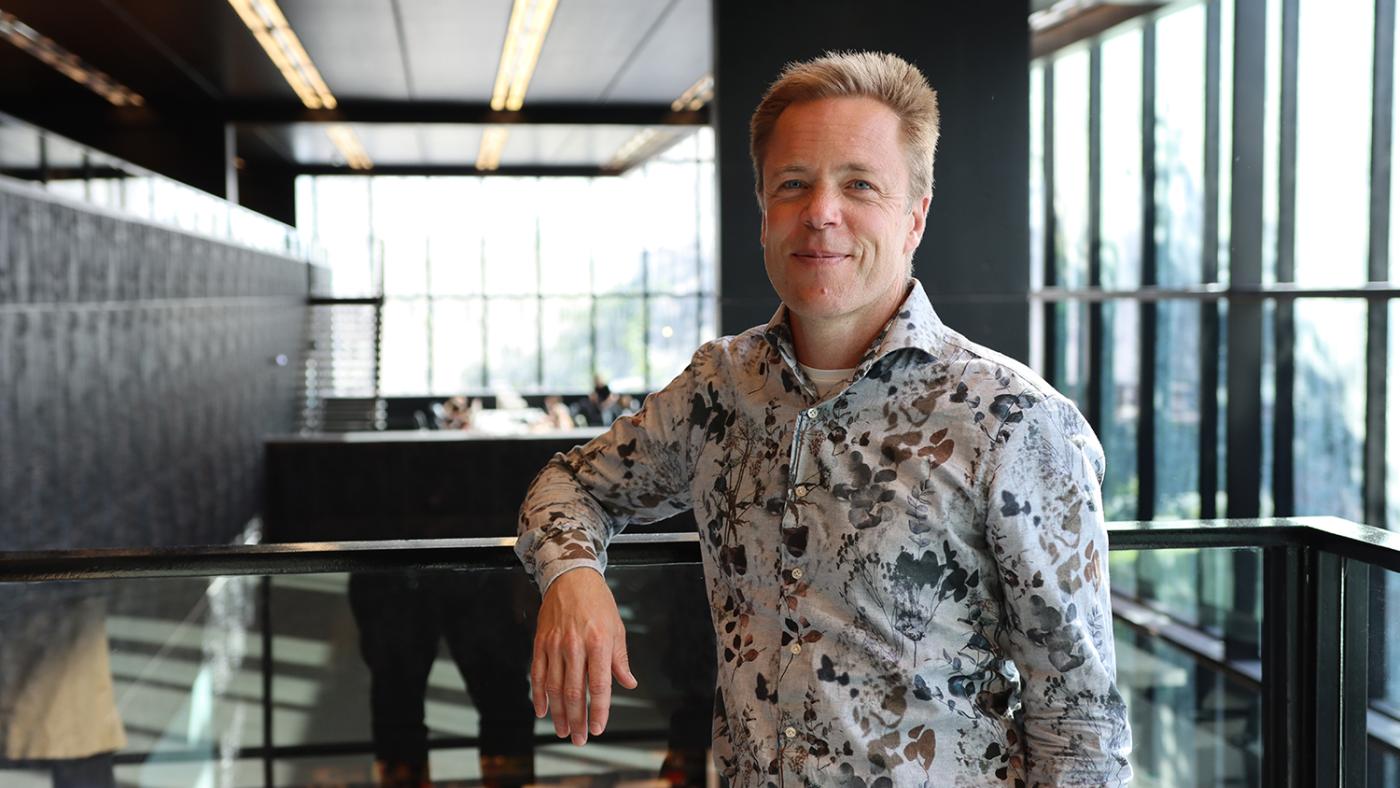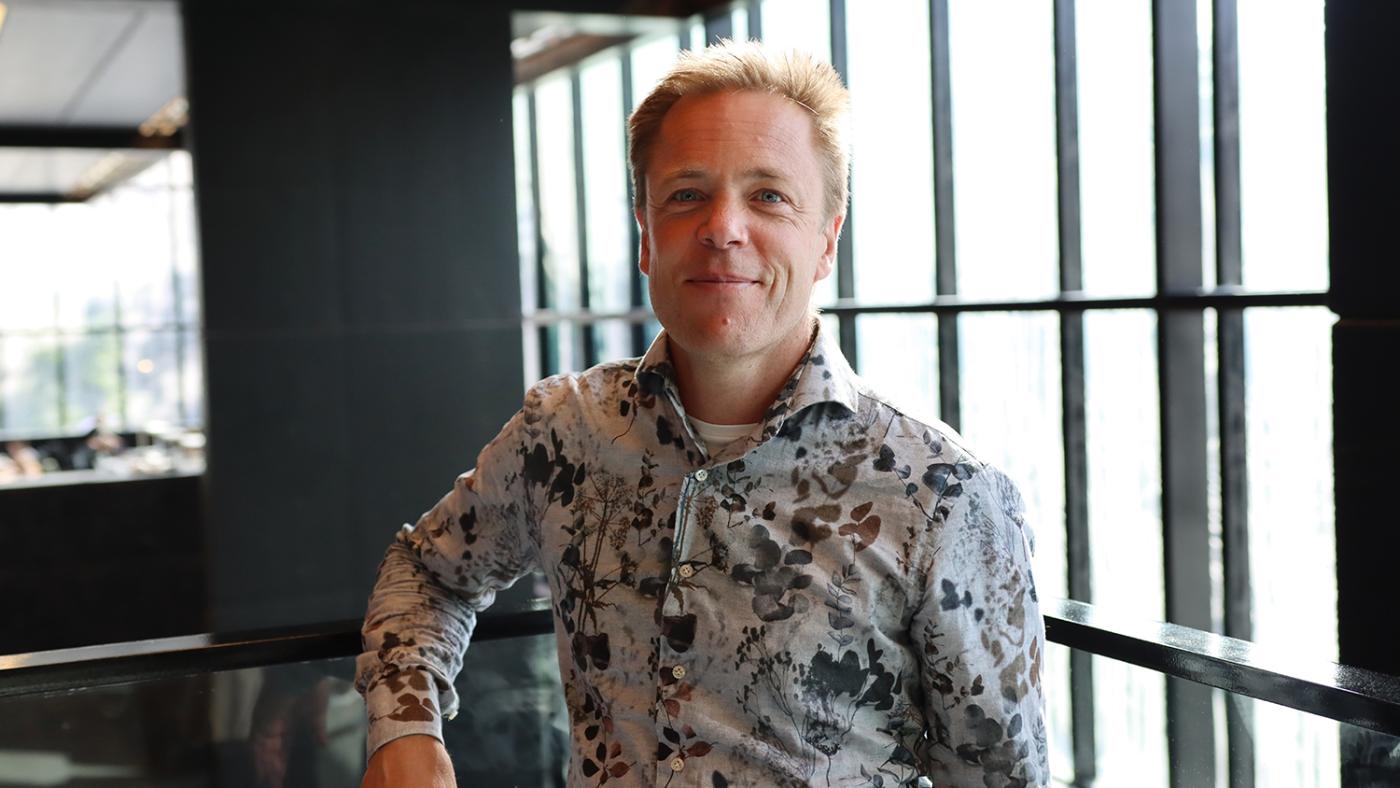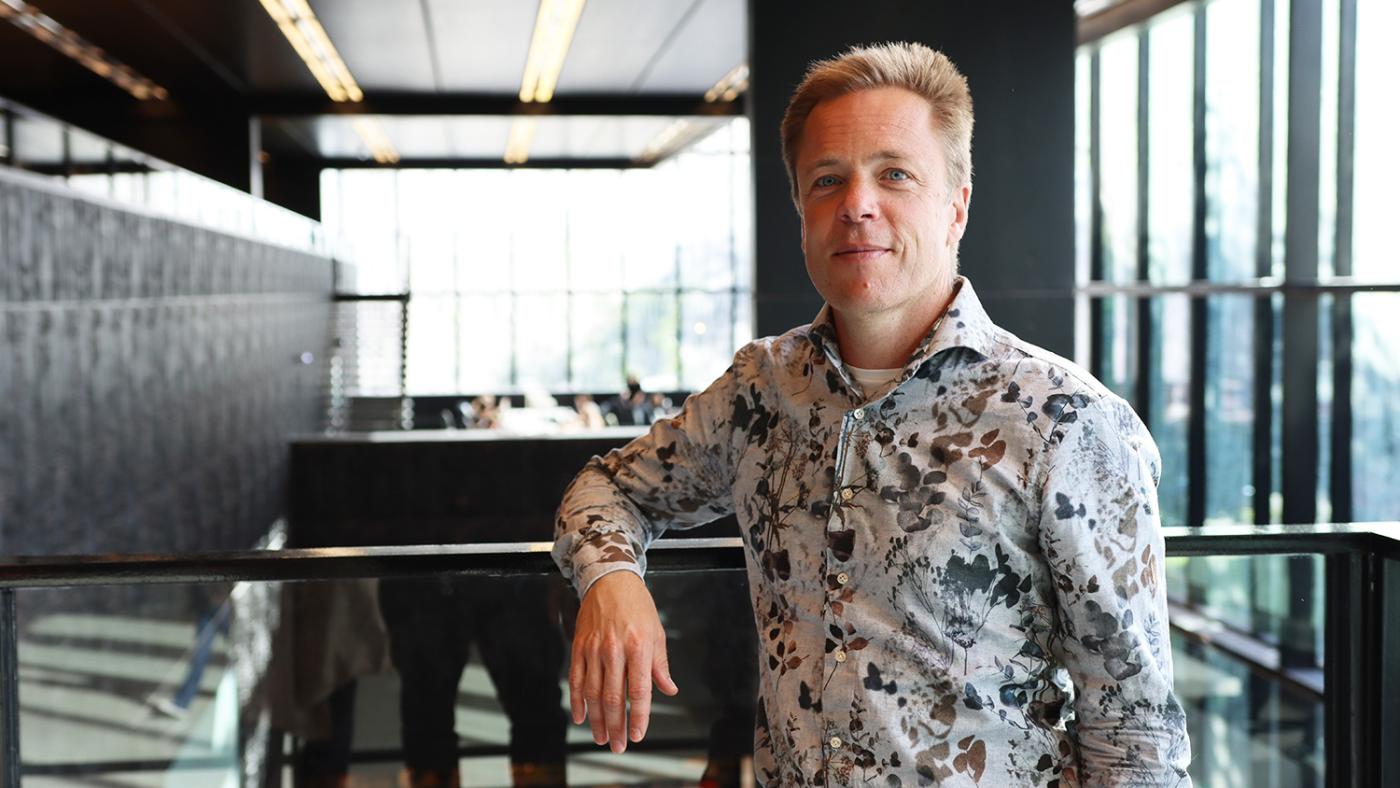Librarian Matthijs van Otegem:
'The library needs to become even more of a student’s building’

Matthijs van Otegem was awestruck when he walked up the huge staircase at the Science Park library for the first time. “I was so impressed. You enter the building and immediately see the main hall and three flights of stairs. It has a bit of an Esscher effect. This is a building that wants to be seen.”
According to Van Otegem, the twenty-year old building is one of the most striking and impressive among libraries. “It’s a design library, a landmark. But you have to ask yourself: how does the building suit the user? We don’t want to impress visitors, the library should be a building where students feel at home. They own his place.”
You studied in Amsterdam and obtained your PhD in Utrecht. Did you spend all day in the library when you were a student?
“When I was studying Book Studies in Amsterdam, I liked to study in the Arts Library. I would come very early when no one was there yet. It was wonderful. By the time it filled up, I had already finished what I had to do and could go on to do something fun. During my PhD, you would see me at the library a lot. That's because I was working on a bibliography of the works of Descartes for my thesis, so I had to consult special collections. Unique books from the 17th century were put on the table for me. I visited forty libraries in the Netherlands and abroad for my thesis.”
In recent decades, the University Library has become increasingly popular as a study spot. So how else should it become a student’s building?
“During Covid, I really thought we were going to lose those students, but I completely misjudged that. Students would watch their lectures at home, preferably at twice the speed, and then come to the library to meet each other. I’m glad they’re back. Because their patronage is so important, we must always look at how we can adapt the building to the visitor. I beieve this building is still missing certain things for the students. Imagine you've been sitting here all day and then there is nowhere to eat a sandwich or a takeout pizza. The facilities in the area are meagre. How could we improve that? I would like to talk to students about this. How do they think we can shape this?”

What students need most of all is to be able to come here during exams, which is difficult right now due to a lack of space. The library is not accessible to external parties during exam weeks, but we also hear complaints that the security is too strict and disruptive.
“I understand that all students want to come here during the exam period. For some students, it is essential to study here because they can’t do it at home. However, we can't set up the capacity for peak times. If we did that, the library would be empty for the rest of the year. What we want is the most efficient use of the space. That’s why we try to prevent people from reserving a spot and then leaving or not showing up. Students should also be allowed to think along about how to approach this. Moreover, we need security to ensure that the house rules are followed, but it is even more important that everyone feels comfortable and safe in the library, even if they study here late into the night. Security guards ensure that.”
The University Library is not only a place to study but also a place to get information. In the past, libraries were all about books, but nowadays they are mainly about digital information. Are books going to disappear?
“Books will remain a fixture at our library. We monitor which books are borrowed the most and they are the ones exhibited in the halls. The other books are safeguarded in depots and you have to apply to get them. As to be expected, the most borrowed books are the compulsory first-year readings.
Books make the library a special place to work at. It’s as if the information just happens to arrive here. But our library also has a cultural-historical task through its special collections. Our focus is indeed on digital information services, that much is true. When purchasing material, 95 percent is digital, such as e-journals or e-books. When we purchase a physical book, that's usually at a faculty's request. But there is also a digital gap because we are not allowed to digitise everything. We can't do that with works for which the copyright has not yet expired, for example. Roughly speaking, this concerns a large part of the collection of the last century. According to the law, copyright expires 70 years after the writer's death.”
To what extent does the library participate in UU's education?
“Firstly, we offer courses that help people acquire information literacy. They are open to students too. We also offer accommodation to Career Services, where students can complete other training courses or workshops, including one on writing a thesis.
In addition, we work with teachers on compiling digital readers. We encourage teachers to offer their teaching materials to others. It would be good for teachers if they had access to teaching materials more often than they do now. Then they wouldn't have to keep reinventing the wheel.
What is also interesting is that we store almost all theses and make them accessible. This means you can read practically all theses produced by UU students, except those for which certain agreements are in place or when privacy is at stake. I always tell students who are going to start their thesis that it’s a good idea to take a look at the database for inspiration.”
The University Library is also committed to Open Science. In the past, scientific publications were not accessible to people from outside the university because the library was tied to expensive subscriptions to scientific journals and the associated restrictions. Is that changing?
“We are certainly in favour of disseminating scientific information as widely as possible and we are working on that. We strive to make all UU publications, datasets and software widely accessible, but that doesn’t mean people will have access to all scientific publications from other universities. That’s a problem.
Many publications traditionally appear in scientific journals. Publishers manage that, and subscription rates are extremely expensive. Scientists can also publish in open-access journals. In this case, authors or universities pay to be allowed to publish. This is more accessible, but the dominant position of the publishing house remains. The discussion now is whether Dutch universities should set up their own publication platform, preferably in a national context. But that also costs money. At the end of the day, the conclusion is always that someone has to pay for the publishing process.”
Generative Artificial Intelligence tools, such as ChatGPT, are a challenge in this context. ChatGPT does not have access to academic publications. What is the library’s policy when it comes to generative AI?
“That’s a big discussion right now. We want to give scientists as broad access as possible to research information, including for use in AI applications. This often does not happen because publishers do not permit others to use their texts for this purpose. This has to do with copyright: it is not clear what is and is not allowed. Academic publishers diverge about this. Some shield their publications, while others sell their database to Microsoft, which is a shareholder of ChaGPT. Taylor & Francis is one of the publishers that did that.
We shouldn't see AI as just a threat. It can also allow us to create new things. By digitising special collections, you can use Retrieval Augmented Generation. You can create a specific dataset about the history of Utrecht, which the user can engage in conversation with in the same way as with ChatGPT. The difference is that you’ve fed the machine relevant, reliable information first, reducing the risk of it hallucinating. In doing so, you also make it possible to cite the source. This could be an interesting teaching method in education.
Another application is using AI to explore which collaborations could be of interest to your research group. You have your publications compared with a large database of other publications and AI looks for relevant similarities. These can be similarities in content, but also with whom else your co-authors publish, and by whom you are cited. Or you can use AI for a systematic literature review. Rens van der Schoot and Jonathan de Bruin do this in the ASReview project, in which they use AI to help researchers find the most relevant information for a specific research question. I think it’s great that their group meets every Thursday in the City Centre library to work on further developing the project.
Digital innovation can therefore help to make information accessible, but we should not close our eyes to the downsides. People must remain in charge of the machine.”

Who is Matthijs van Otegem?
Matthijs van Otegem (1975) has been the director UU's Library since October 1, 2022. After obtaining his PhD on Descartes at the Faculty of Philosophy in Utrecht, he worked for twelve years at the National Library of the Netherlands in various positions. From 2013 to 2022, he was director of the library at Erasmus University.